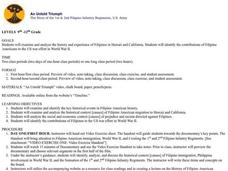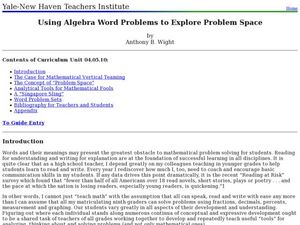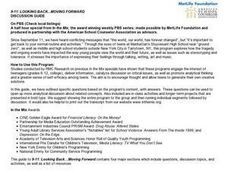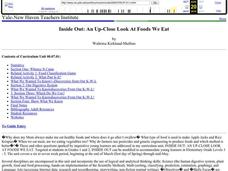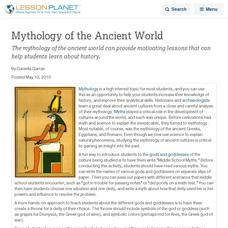Curated OER
Political Parties and Election Results, 1997 and 2000
Young scholars become familiar with the results of the Canadian Federal Election by analyzing data on the number of valid votes by political affiliation. In this civics lesson plan, students integrate data and knowledge with other...
Curated OER
Introduction to Primary Sources
Students explore the usage of primary sources, what they are and how they originate. Artifacts are compared and contrasted as part of this historical inquiry as questions are formulated and conclusions drawn.
Curated OER
Basil Heatter, "The Long Night of the Little Boats"
“It was a miracle.” Basil Heatter’s “The Long Night of the Little Boats,” which details the miraculous rescue of the British army from the shores of Dunkirk in 1940, is featured in a series of exercises that ask class members to read,...
Curated OER
Natural Resources and Ancient Cities
Students explain how the availability of natural resources has affected human settlement patterns. They recognize the interactions of human populations on environments and compare the growth of two ancient cities in relation to natural...
Curated OER
An Untold Triumph
High schoolers examine and analyze the history and experience of Filipinos in Hawaii and California. They identify the contributions of Filipino Americans to the US war effort in World War II, and analyze the many causes that led to...
Curated OER
Using Algebra to Explore Problem Space
Students apply their knowledge of math by rewriting word problems using equations. In this word problem lesson, students build upon previous knowledge as they set up the correct steps to solve word problems. This lesson is full of hints...
EngageNY
Modeling with Exponential Functions
These aren't models made of clay. Young mathematicians model given population data using exponential functions. They consider different models and choose the best one.
Curated OER
9-11: Looking Back...Moving Forward
Students watch and discuss a video about teens living in and around New York and how 9-11 changed their lives. They answer discussion questions, read and discuss newspaper/magazine articles, take a self-test on depression, and create a...
Curated OER
Inside Out: An Up-Close Look At Foods We Eat
Fourth graders identify the origins of meats and vegetables consumed by humans on a daily basis. They classify foods (meats, dairy products, grains...) and create a food pyramid.
Curated OER
Alphabet Sideshow
Students practice sound and recognition of letters in alphabetical sequence. They gain an understanding of letter sounds and order. They create a slide show with graphics and text. They present their slide show to the class.
Curated OER
English Literature - PowerPoint PPT Presentation
Everything you wanted to know about the history of English literature and language but were afraid to ask. From Beowulf to Canterbury Tales, the Knights of the Round Table to Robin Hood, Addison, Fielding, Shakespeare, Swift, and many...
Curated OER
The World's Simplest Cartesian Diver
Have your class learn about buoyancy using this simple lesson. First, they bring in condiment packets and see what happens when they place it in a glass of water. Then, they use one of the packets to illustrate the concept of a Cartesian...
Curated OER
An Introduction to Microbes and Microbes Are Everywhere
Seventh graders define the term microbe. They identify the five main groups of microbes. Students give examples of ways in which microbes have impacted or currently impact human life. They create a hypotheses for where they expect to...
Curated OER
Debate: Is Cheerleading a Sport?
Students research how women are perceived in sports. They debate the issue of whether cheer leading should be considered a sport and are scored on student made rubrics.
Curated OER
Food Journal Exercise
Students are required not to change their usual eating pattern while recording everything they eat and drink for 1 day. They evaluate the nutrient composition of their diet, as well as their dietary intake and behavior within the...
Curated OER
Analyzing Photographs: From Theory to Practice
Students analyze photographic images and use cameras to document their own life. In this analyzing photography lesson, students apply formal analysis techniques to images, then create a documentary of photographic images with artist...
Curated OER
Mythology of the Ancient World
The mythology of the ancient world can provide motivating lessons that can help students learn about history.
Curated OER
Marketing Research Projects
Students research customer service offerings of a particular business and present their conclusions to the class using PowerPoint and additional visual aids. The guidelines for this lesson can be found through the National DECA.
Curated OER
Art and Anatomy: The Vitruvian Teen
Twelfth graders create an artistic version of a Vetruvian teen. For this anatomy lesson, 12th graders design an experiment to test the theory of the ideally proportioned man. They present their findings in class.
Curated OER
The Village and the Stars
Eighth graders discuss early school memories. They assess hopes and aspirations in greater detail and discover the importance of education as one of the shapes of our 'selves'. They observe parents' reactions to children growing up...
Curated OER
Revealing Untold Stories
Students explore how and why various historical resources present information about slavery differently. They work in pairs to examine written texts to interpret the objectives, points of view, and depictions of slavery in these resources.
Curated OER
Traveler's in Time
Students analyze artifacts to become familiar with the Great Migration. In this migration lesson, students read an article and answer comprehension questions. Students role play a migration scenario using an artifact to help describe...
Curated OER
Surface Area and Measuring
Tenth graders explore volume and surface area through percentages. In this geometry lesson, 10th graders analyze the surface area of two and three dimensional shapes, then use percents and ratio to compare the two.
Curated OER
Invention: Computer Technology
Students comprehend that inventions can change the way we live. They comprehend that many inventions start out with design flaws and are refined later by subsequent inventors and designers. Students are explained that the computer, was...






